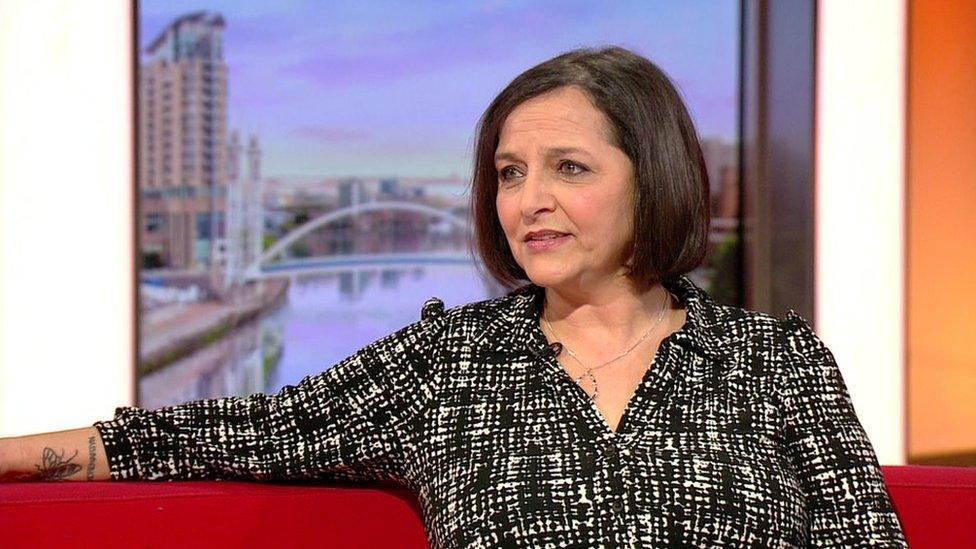Help us make venues safer, urges bomb victim's mum
- Published

Figen Murray has called for a new law making it compulsory for every venue to assess the risk of a terror attack
The mother of Martyn Hett, who died in the terror attack at Manchester Arena, has called on venues to help shape a new law to ensure the safety of fans at concerts and other big events.
Figen Murray has been lobbying the government to bring in new security measures since her son's death in 2017.
The Home Office has said it will now consult on "Martyn's Law" to require venues to prepare for any terror risks.
Ms Murray said the "common-sense step... will save lives in the future".
"Today's consultation is the start of making us all that bit safer," said Ms Murray, who urged businesses and the public to get involved.
Ms Murray spearheaded the campaign to introduce Martyn's Law, which requests measures such as airport-style security checks - including bag searches and metal detectors - at large public venues. She launched a petition in 2018 that gathered more than 23,000 signatures., external
She said: "Public venues already have all sorts of obligations from fire prevention to health and safety - but until now there has been no duty to protect their customers.
"Martyn's Law will change that. It's a common-sense step that will save lives in the future."
Martyn Hett was one of 22 people killed in the Manchester Arena attack, when Salman Abedi blew himself up at the end of the Ariana Grande concert, leaving hundreds more injured.
A Coronation Street superfan, the 29-year-old's funeral was attended by many members of the soap's cast and saw tributes from singers Michelle McManus and Mariah Carey.
Since the 2017 attack, backpacks and large bags have been banned from large concert venues, but there is no legislation requiring security checks at all public venues.
'Proportionate' law
Under the government's proposals, external, Parliament would pass a new law that would impose a legal duty on whoever is responsible for the management of public spaces.
The new law would require owners and operators to consider the risk of an attack and the plans they have in place to either help prevent it happening - or to manage the aftermath.
The duty could include obligations to review and improve not only the physical security of a location, but also how well staff members are trained to deal with an incident.
Final plans will follow a consultation in the spring and Ms Murray made her plea to venue owners and businesses that put on big events to play their part in that process.
Security Minister James Brokenshire said: "We are in complete agreement with campaigners such as Figen Murray on the importance of venues and public spaces having effective and proportionate protective security and preparedness measures to keep people safe.
"Of course, it is important that this new law is proportionate. This public consultation will ensure we put in place a law that will help protect the public, while not putting undue pressure on businesses."

Martyn Hett was one of 22 people killed in the Manchester Arena attack on 22 May 2017

How far-reaching will this new law be?

This announcement follows the conviction last Friday of a woman who wanted to take a bomb into St Paul's Cathedral and blow it up.
Safiyya Shaikh recorded the landmark's security arrangements - a classic example of how would-be attackers prepare.
That case revealed a threat at the extreme end of the spectrum - but how should other public spaces prepare when the behaviour that needs stopping can be very difficult to spot or predict?
The proposed new legal duty aims to be a balancing act - working out what would be proportionate, relative to the risk of an attack.
The O2 Arena in London, for instance, has an enormous security operation, including measures to stop vehicle attacks.
But while a pub wouldn't need the same level of security, would the landlady benefit from having thought about how to protect customers amid an attack outside - just like at Borough Market in 2017.
So supporters of the law say the goal is to make it scaleable - ensuring that all businesses where the public congregate have considered the risks, rather like they do already for fire, so they know how to respond were the worst to happen.

The forthcoming inquiry into the Manchester attack is expected to examine how prepared the arena had been for such an event.
Manchester City's council has already pledged to introduce its own version of Martyn's Law as part of licensing rules for clubs and venues.
Last November, the coroner at the inquests for the eight victims of the 2017 London Bridge attack urged the government to consider a legal duty after hearing evidence of missed opportunities to better protect the area.
The shadow security minister Nick Thomas-Symonds paid tribute to campaigners behind Martyn's Law, but said the government needed to reverse police cuts.
"There can be no objection to proper consultation on a duty to protect and we pay tribute to those who have campaigned for this change.
"However, a duty to protect is no substitute for professional policing. Combating the terrorists requires everything from community policing through to counter-terrorism."
Greater Manchester Mayor Andy Burnham has previously called on security against terror attacks at venues to be "mandatory not discretionary".
- Published12 January 2020

- Published8 January 2020

- Published30 June 2017
